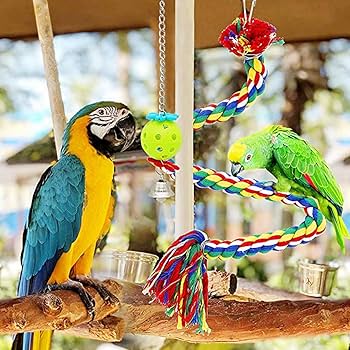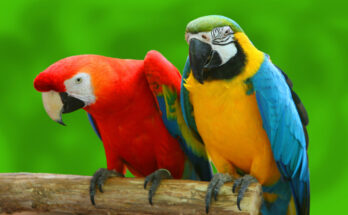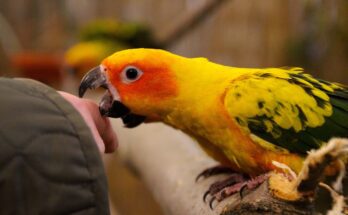Parrots are intelligent and playful birds that love to explore, chew, and interact with their surroundings. If you have a parrot, you already know how curious and active they can be. One of the best ways to keep them happy and healthy is by giving them toys.
Toys are not just for fun – they are important for your parrot’s mental and physical health. In this article, we will talk about why parrot toys are important, the types of toys available, and tips on choosing the best ones for your feathered friend.
Why Do Parrots Need Toys?
Parrots are smart and active birds. In the wild, they spend their day flying, searching for food, chewing branches, and socializing with other birds. Pet parrots don’t have the same environment, so toys are important to fill that gap.
Here’s why toys are a must:
- Prevent Boredom – A bored parrot may scream, pluck its feathers, or become aggressive. Toys keep them busy and entertained.
- Encourage Exercise – Climbing, chewing, and swinging on toys keep parrots physically fit.
- Mental Stimulation – Puzzle and foraging toys challenge their brain and improve problem-solving skills.
- Beak Health – Chewing toys helps keep their beaks strong and trimmed naturally.
- Bonding and Training – Playing with toys together helps strengthen your bond with your parrot.
Types of Parrot Toys
There are many types of toys made for parrots. Here are some popular ones:
1. Chewing Toys
Parrots love to chew. Chewing keeps their beak healthy and satisfies their natural instinct.
- Made of wood, rope, leather, or vegetable-dyed materials.
- Great for parrots that chew furniture or cage bars.
2. Foraging Toys
These toys encourage parrots to search for food, just like in the wild.
- Treats or pellets are hidden inside.
- Keeps parrots busy and mentally active.
3. Climbing Toys
Parrots enjoy climbing because it exercises their feet and legs.
- Includes ladders, ropes, swings, and hanging nets.
4. Interactive Toys
These toys make noise, move, or have parts that can be moved around.
- Bells, rollers, and puzzle toys are examples.
- Great for curious parrots that love sound and movement.
5. Foot Toys
Small toys designed for parrots to hold and manipulate with their feet.
- Improves coordination and keeps them engaged.
Choosing the Right Toy for Your Parrot
Every parrot is different, so you need to pick toys based on their size, personality, and habits.
- Size Matters – Small toys can be dangerous for large parrots, while big toys may scare small birds. Choose toys that are the right size for your parrot.
- Material Safety – Always pick bird-safe materials (untreated wood, stainless steel, vegetable dyes). Avoid toys with toxic paint or unsafe metal parts.
- Variety – Offer different types of toys (chew, climb, puzzle) to keep your parrot interested.
- Easy to Clean – Toys get dirty quickly, so choose ones you can clean easily.
DIY Parrot Toys
You don’t always have to buy toys; you can make some at home:
- Paper Rolls – Empty toilet paper rolls can be fun for chewing and shredding.
- Cardboard Boxes – Safe, clean cardboard boxes for climbing and chewing.
- Natural Branches – From bird-safe trees like apple or willow (make sure they’re pesticide-free).
- Ropes and Beads – Use 100% cotton rope and non-toxic beads for simple hanging toys.
(Tip: Always supervise your parrot with homemade toys to ensure safety.)
How Many Toys Should a Parrot Have?
A parrot should have at least 3–5 toys in their cage at a time, but it’s a good idea to rotate them weekly. Changing toys keeps things fresh and prevents boredom.
Tips for Safe Playtime
- Check Toys Regularly – Remove broken or frayed toys to prevent accidents.
- Supervise New Toys – Some parrots may be scared of new items, so introduce slowly.
- Avoid Small Parts – Toys with small pieces can be a choking hazard.
- Use Bird-Safe Hooks – Make sure toys are securely attached to the cage.
Benefits of Parrot Toys
- Healthier Mind and Body – Toys keep your parrot active and prevent obesity.
- Better Behavior – Engaged parrots are less likely to scream or pluck feathers.
- Bonding and Happiness – Playing with your parrot helps build trust and love.
- Longer Life – A happy and mentally stimulated parrot often lives a healthier and longer life.
What if My Parrot Doesn’t Like Toys?
Some parrots are shy or scared of toys at first. Here’s how to help:
- Place the toy outside the cage for a few days so the bird gets used to it.
- Play with the toy yourself to show it’s safe.
- Attach treats to the toy to encourage exploration.
- Start with small, quiet toys and slowly move to bigger ones.
Final Thoughts
Parrot toys are more than just fun – they are essential for your bird’s mental and physical health. From chewing and foraging toys to climbing ropes and interactive puzzles, there’s a wide variety to choose from. Always pick safe, size-appropriate toys and rotate them regularly to keep your parrot excited and entertained.
By providing toys, you’re giving your parrot a happier, healthier life full of play, learning, and enrichment. Remember, a busy parrot is a happy parrot!




